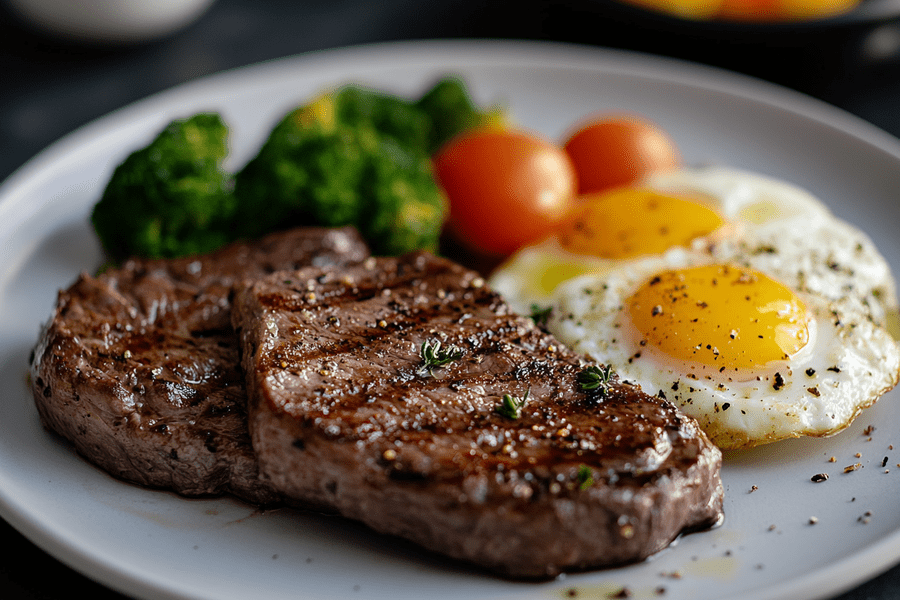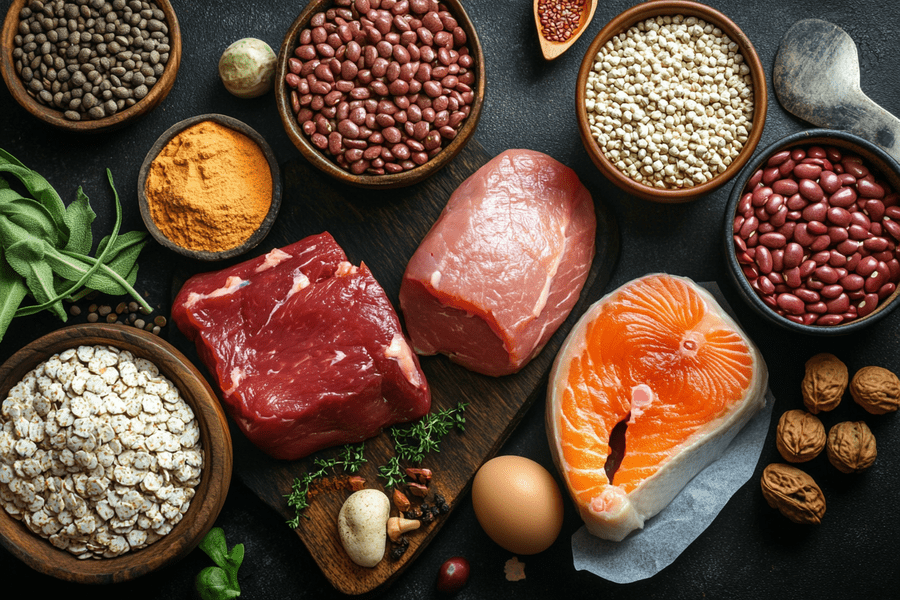
Protein is a crucial macronutrient for maintaining health, building muscle mass, and supporting weight loss efforts. Many people wonder how much protein they should consume daily to meet their nutritional needs and achieve their fitness goals. While individual requirements vary, most adults should aim to consume between 1.2 to 2.0 grams of protein per kilogram of body weight daily.
This range provides sufficient protein for muscle maintenance and growth while supporting overall body composition. Those engaged in intense physical activity or looking to increase muscle mass may benefit from the higher end of this range. It’s important to note that consuming excessive amounts of protein beyond these recommendations does not necessarily lead to additional health benefits.
Incorporating high-quality protein sources into one’s diet can help meet these requirements. Lean meats, fish, eggs, dairy products, legumes, and plant-based alternatives all contribute to a balanced protein intake. By focusing on a varied diet that includes these protein-rich foods, individuals can ensure they’re meeting their nutritional needs without overcomplicating their meal planning.
Contents
Proteins and Their Role
Proteins are essential macronutrients that play crucial roles in the body. They serve as building blocks for tissues, function as enzymes, and provide energy when needed.
What Is Protein?
Proteins are large, complex molecules composed of amino acids. These amino acids are linked together in long chains, forming the basis of protein structure. There are 20 different amino acids that can combine in various ways to create thousands of unique proteins.
Essential amino acids are those that the body cannot produce on its own and must be obtained through diet. Non-essential amino acids, on the other hand, can be synthesised by the body.
Proteins can be found in a wide range of foods, including:
- Meat and poultry
- Fish and seafood
- Eggs
- Dairy products
- Legumes and pulses
- Nuts and seeds
The Role of Proteins in the Body
Proteins perform numerous vital functions in the body. They are responsible for:
- Building and repairing tissues
- Producing enzymes and hormones
- Supporting immune function
- Maintaining fluid balance
- Transporting nutrients
Enzymes, which are specialised proteins, catalyse chemical reactions in the body. They play a crucial role in digestion, metabolism, and other bodily processes.
Proteins also serve as messengers, helping cells communicate and coordinate their activities. This is essential for proper growth, development, and overall health.
Protein as a Macronutrient
As a macronutrient, protein is required in relatively large amounts in the diet. Along with carbohydrates and fats, it provides energy to the body.
Protein contains 4 calories per gram, the same as carbohydrates but less than fats (9 calories per gram). While it can be used for energy, the body primarily uses protein for its other functions.
The amount of protein needed varies based on factors such as age, sex, activity level, and overall health. Generally, adults should aim for 0.8 to 1 gram of protein per kilogram of body weight daily.
Consuming adequate protein is crucial for:
- Muscle growth and repair
- Bone health
- Satiety and weight management
- Maintaining a strong immune system
It’s important to consume a variety of protein sources to ensure intake of all essential amino acids.
Determining Protein Requirements
Protein requirements vary based on individual factors and lifestyle. Accurate assessment involves considering age, sex, body composition, and activity level. Specific recommendations and calculation methods can help determine optimal intake.
Factors Affecting Protein Needs
Body weight, muscle mass, and physical activity significantly impact protein requirements. Athletes and those engaged in regular exercise typically need more protein to support muscle repair and growth.
Height and overall body composition also play a role. Taller individuals and those with higher lean body mass generally require higher protein intake.
Age is another crucial factor. Children and adolescents need more protein per kilogram of body weight to support growth and development. Older adults may benefit from increased protein intake to maintain muscle mass and strength.
Pregnancy and lactation increase protein needs to support foetal growth and milk production.
Calculating Your Protein Intake
To calculate individual protein needs, consider body weight and activity level. A common method is to multiply body weight in kilogrammes by a factor based on activity:
- Sedentary adults: 0.8 g per kg
- Moderately active adults: 1.2-1.4 g per kg
- Highly active adults or athletes: 1.4-2.0 g per kg
For example, a 70 kg moderately active adult would need 84-98 g of protein daily.
Online protein calculators can provide personalised estimates based on weight, height, age, sex, and activity level. These tools offer a convenient starting point for determining individual protein requirements.
It’s important to note that these calculations provide general guidelines. Consulting a registered dietitian can help tailor protein intake to specific health goals and dietary needs.
Protein Sources and Quality

Protein sources vary widely in their nutritional profiles and amino acid compositions. The quality and completeness of proteins from different foods can significantly impact their utilisation by the body.
Animal vs. Plant-Based Protein
Animal proteins are generally considered complete proteins, containing all essential amino acids in adequate amounts. Meat, fish, eggs, and dairy products are excellent sources of high-quality protein. These foods typically provide a higher protein density per serving compared to plant-based options.
Plant-based proteins, found in nuts, seeds, legumes, and grains, often lack one or more essential amino acids. However, combining different plant protein sources can create complete protein profiles. Vegetarian and vegan diets can meet protein needs through careful food selection and combination.
Some plant-based foods, such as quinoa and soya, are complete proteins. These options are particularly valuable for those following plant-based diets.
The Significance of Amino Acids
Amino acids are the building blocks of proteins. The body requires 20 different amino acids, of which 9 are considered essential as they cannot be produced internally.
High-quality protein sources provide all essential amino acids in proportions that match human requirements. This balance is crucial for optimal protein synthesis and utilisation.
The amino acid profile of a protein source affects its biological value. Animal proteins generally have a higher biological value than plant proteins due to their more complete amino acid profiles.
Combining different protein sources in a meal can improve the overall amino acid profile. This strategy is particularly important for those relying primarily on plant-based proteins.
Incorporating Protein into Your Diet

Proper protein intake requires careful consideration of balanced nutrition and strategic meal planning. Incorporating adequate protein involves understanding macronutrient ratios and portion sizes to meet individual dietary needs.
Balancing Macronutrients
A well-balanced diet includes appropriate amounts of protein, carbohydrates, and fats. Protein should typically comprise 10-35% of total caloric intake, depending on individual goals and activity levels. For most adults, this translates to about 0.8-1.2 grams of protein per kilogramme of body weight daily.
Carbohydrates generally make up 45-65% of calories, whilst fats account for 20-35%. These ranges allow flexibility to adjust based on personal needs and preferences. A dietitian can help determine optimal macronutrient ratios.
To achieve balance, include a variety of protein sources:
- Lean meats and poultry
- Fish and seafood
- Eggs
- Dairy products
- Legumes and pulses
- Nuts and seeds
Meal Planning and Portion Sizes
Effective meal planning ensures consistent protein intake throughout the day. Aim to include protein in each meal and snack. A typical portion of protein is about the size of a palm or deck of cards, roughly 85-115 grams.
Sample protein portions:
- 150g chicken breast: 30g protein
- 1 large egg: 6g protein
- 200g Greek yoghurt: 20g protein
- 100g lentils (cooked): 9g protein
Spread protein intake across meals to optimise absorption and utilisation. For example, a day’s meals might include:
- Breakfast: 2 eggs with whole-grain toast
- Snack: Greek yoghurt with nuts
- Lunch: Grilled chicken salad
- Dinner: Baked fish with quinoa and vegetables
This approach helps maintain steady energy levels and supports muscle health throughout the day.
Protein Intake and Health Considerations
Protein intake plays a crucial role in various aspects of health, from weight management to muscle growth and special physiological conditions. The amount of protein one consumes can have significant impacts on body composition and overall well-being.
The Impact of Protein on Weight Management
Protein has a notable effect on weight control. It promotes satiety, helping individuals feel fuller for longer periods. This can lead to reduced calorie intake and assist in weight loss efforts.
A high-protein diet may increase metabolism, as the body expends more energy digesting protein compared to fats or carbohydrates. This thermic effect can contribute to a slight boost in daily calorie burn.
For those aiming to lose fat whilst preserving lean muscle mass, adequate protein intake is essential. It supports muscle retention during calorie-restricted diets, promoting a healthier body composition.
Protein also plays a role in body recomposition, allowing individuals to build muscle and lose fat simultaneously when combined with appropriate exercise.
Potential Concerns with High Protein Intakes
While protein is vital for health, excessive intake may pose risks:
- Kidney strain: Those with existing kidney issues should be cautious about high protein consumption.
- Calcium loss: Some studies suggest high protein diets might increase calcium excretion, potentially affecting bone health.
- Digestive discomfort: Consuming large amounts of protein can lead to gastrointestinal issues in some individuals.
It’s important to note that for most healthy adults, moderate increases in protein intake are generally safe. However, extreme high-protein diets may not provide additional benefits and could potentially lead to nutrient imbalances.
Protein Needs During Special Conditions
Protein requirements can vary based on specific physiological states:
- Pregnancy and lactation: Increased protein intake is necessary to support foetal growth and milk production.
- Ageing: Older adults may benefit from higher protein intakes to combat age-related muscle loss (sarcopenia).
- Physical activity: Athletes and those engaged in regular intense exercise typically require more protein to support muscle recovery and growth.
During illness or injury, protein needs may increase to support healing and maintain muscle mass. Tailoring protein intake to individual circumstances is crucial for optimising health outcomes.
For those considering protein supplements, it’s essential to evaluate whether dietary sources can meet their needs before turning to supplementation.
Frequently Asked Questions
Protein intake recommendations vary based on individual factors and goals. Understanding optimal amounts for muscle gain, weight loss, and general health is crucial for tailoring one’s diet effectively.
What quantity of protein is required to augment muscle mass?
To build muscle mass, consuming 1.6 to 2.2 grams of protein per kilogram of body weight daily is often recommended. This amount supports muscle protein synthesis and repair after resistance training.
Higher intakes may be beneficial for those engaged in intense strength training or bodybuilding. It’s important to spread protein consumption throughout the day for optimal absorption.
How does one calculate their necessary protein intake?
Calculating protein needs involves considering body weight, activity level, and health goals. A general guideline is 0.8 grams per kilogram of body weight for sedentary individuals.
For active people, this increases to 1.2-1.6 grams per kilogram. Multiply your weight in kilogrammes by the appropriate factor to determine your daily protein requirement in grams.
What is the recommended protein consumption for weight loss?
For weight loss, a higher protein intake can be beneficial. Aim for 1.6 to 2.2 grams of protein per kilogram of body weight.
Protein helps preserve muscle mass during weight loss and increases satiety, potentially reducing overall calorie intake. It also has a higher thermic effect, meaning it burns more calories during digestion.
Can you determine the protein content of an egg?
A large egg contains approximately 6-7 grams of protein. The egg white provides about 3.6 grams, while the yolk contains around 2.7 grams.
Eggs are considered a complete protein source, containing all nine essential amino acids. They are also rich in other nutrients like vitamin D and choline.
What amount of protein is advisable for a woman on a daily basis?
The protein requirements for women depend on factors such as age, activity level, and pregnancy status. Generally, adult women should consume at least 0.8 grams of protein per kilogram of body weight daily.
For active women or those over 65, this requirement increases to 1.0-1.2 grams per kilogramme. Pregnant women need additional protein, typically 1.1-1.5 grams per kilogramme.
Is a daily intake of 100 grams of protein necessary for health?
A daily intake of 100 grams of protein is not necessary for everyone’s health. The requirement varies based on individual factors such as body weight, activity level, and health goals.
For some people, particularly larger individuals or those engaged in intense physical activity, 100 grams may be appropriate. However, for others, this amount could be excessive and unnecessary.
